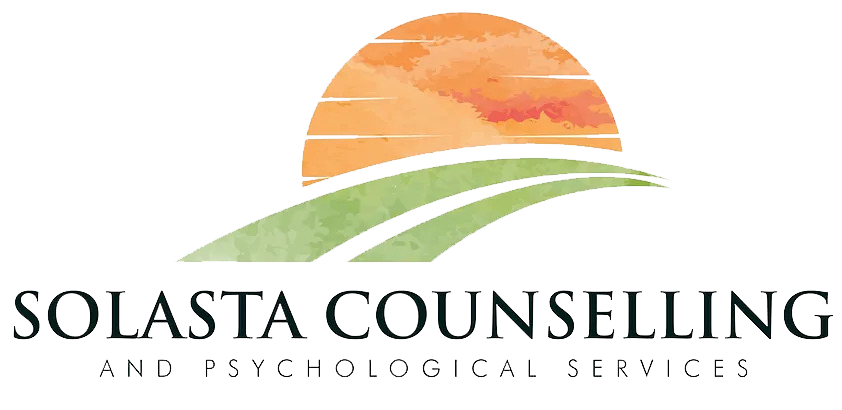Acceptance and Commitment Therapy in Calgary
We offer Acceptance and Commitment Therapy (ACT) to help you develop psychological flexibility and live a more meaningful life.

What is Acceptance and Commitment Therapy?
Acceptance and Commitment Therapy combines mindfulness techniques with values-based action to help you navigate life’s challenges.

Rather than avoiding or suppressing uncomfortable emotions, ACT encourages you to observe and accept them as a natural part of life. The “commitment” aspect involves taking meaningful actions aligned with your core values, even in the presence of difficult thoughts or feelings. This approach fosters psychological flexibility, helping you move past mental traps like worry and avoidance to build a more purposeful and fulfilling life.
ACT is structured around six core processes that help individuals move from feeling stuck or overwhelmed to becoming more psychologically flexible:
Cognitive Defusion
Cognitive defusion involves separating yourself from your thoughts, so that they don’t define you or control your actions.
“How can ACT help me stop being controlled by my thoughts?”
In ACT, you learn to observe your thoughts from a distance, rather than becoming entangled in them. This process helps you see thoughts as just thoughts, not truths that you must act on. By defusing from your thoughts, you gain greater freedom and can focus on what matters most.
Acceptance
Acceptance involves allowing yourself to experience uncomfortable thoughts, emotions, and sensations without resistance.
“How do I accept difficult emotions without getting overwhelmed?”
ACT teaches you to approach your difficult emotions with openness and compassion, rather than avoiding or suppressing them. This doesn’t mean you have to like or approve of these emotions, but rather that you allow them to be present without letting them dictate your actions.
Being Present (Mindfulness)
Being present means being fully engaged in the current moment, without getting caught up in past regrets or future worries.
“How does mindfulness help with anxiety or depression?”
By practicing mindfulness, you learn to focus on the present moment, rather than getting lost in negative thinking. This can reduce feelings of anxiety and depression, as you shift your attention from rumination to engaging with the here and now.
Self-as-Context
Self-as-context refers to the ability to observe your thoughts and emotions from a broader perspective, rather than identifying with them.
“What does it mean to see myself as the observer of my thoughts?”
In ACT, you learn to see yourself as separate from your thoughts and feelings, which allows you to reduce their power over you. By understanding that your thoughts and feelings do not define you, you create space for more self-compassion and acceptance.
Values Clarification
In ACT, identifying your core values is a key part of the process.
“How do I figure out what I truly value?”
Through ACT, you’ll explore what matters most to you in life—whether it’s relationships, personal growth, health, creativity, or something else. Clarifying your values helps you live in alignment with your true self and provides direction for your actions.
Committed Action
Committed action involves taking steps toward your values, even in the face of discomfort.
“How can I act on my values when I’m struggling with negative emotions?”
ACT encourages you to commit to actions that are meaningful to you, despite the presence of difficult emotions or thoughts. This helps you live a life that’s in line with your values, leading to a greater sense of fulfillment and purpose.
Who Can Benefit from ACT?
ACT is a versatile therapy that can support individuals dealing with a wide range of mental health challenges.

It is especially helpful for those struggling with anxiety, depression, stress, and low self-esteem. ACT can also benefit individuals facing life transitions, chronic pain, or issues related to addiction. It helps people embrace difficult emotions and take action based on their core values to live a more fulfilling life. It is particularly effective for:
Anxiety and Stress
ACT can help you break free from the cycle of worry and stress by teaching you how to accept and manage anxiety, rather than avoid or control it.
“Can ACT help with anxiety?”
Yes, ACT encourages you to experience anxiety without letting it take over, so you can engage in life despite feeling anxious.
Depression
For those struggling with depression, ACT helps shift the focus away from avoiding painful emotions and toward taking action based on your values.
“How can ACT help with depression?”
ACT helps you break the cycle of depressive thinking by promoting acceptance and encouraging actions that bring meaning and joy back into your life.
Trauma and PTSD
ACT is effective in treating trauma-related conditions, such as PTSD, by helping individuals accept the painful memories and emotions associated with the trauma.
“Can ACT help me heal from trauma?”
Yes, ACT allows you to process trauma without being overwhelmed by it, and helps you focus on moving forward in alignment with your values.
Chronic Pain
Living with chronic pain can feel like an overwhelming battle. ACT helps individuals with chronic pain accept the experience of pain and focus on living a meaningful life despite it.
“Can ACT help with chronic pain?”
Yes, ACT is effective in helping individuals find ways to cope with chronic pain by focusing on what matters most, rather than the pain itself.
Relationship Issues
ACT can be helpful for couples and individuals dealing with relationship difficulties by encouraging communication, acceptance, and taking action toward relationship goals.
“How can ACT improve my relationship?”
ACT helps you and your partner accept difficult emotions and communicate more effectively, leading to healthier and more fulfilling relationships.
Life Transitions
Whether you’re navigating a career change, a move, or a significant life event, ACT can help you manage uncertainty and take meaningful steps toward your goals.
“Can ACT help me during a life transition?”
Yes, ACT supports you in making decisions and taking actions that align with your values, even during times of uncertainty.
What to Expect in ACT Therapy at Solasta Counselling
At Solasta, our therapists will guide you through the six core processes of ACT, helping you develop skills to manage difficult emotions, take action toward your goals, and live more fully in line with your values.

What Will My First Act Session Be Like?
In your first session, your therapist will introduce the principles of ACT and help you identify your current struggles and goals. From there, you will begin to explore your thoughts and emotions through the lens of acceptance, mindfulness, and values-based action.
ACT is typically short-term and can be highly effective in a few sessions, although the length of therapy depends on your unique goals and challenges.
How Many Sessions Do I Need to See Results?
Many clients experience positive changes within a few sessions, though the process may take longer for some individuals.
How Will Act Help Me Manage Stress and Anxiety?
ACT helps you develop mindfulness skills to better manage stress and anxiety by accepting difficult emotions without being overwhelmed by them.
By focusing on values-based actions, you’ll learn to move forward even when faced with challenging feelings.

Why Choose Solasta Counselling for ACT in Calgary?
Our experienced ACT therapists are passionate about helping clients develop psychological flexibility and live more meaningful, value-driven lives.
Calgary Counselling and Psychology Services
Our Calgary psychologists have a wide range of experience and expertise in understanding the unique needs of our clients and helping you reach your therapy goals.
CAP
All of our psychologists are registered with the College of Alberta Psychologist.
PAA
Many of our psychologists are members of the Psychology Association of Alberta.
CCPA
Many of our psychologists are members of the Canadian Counselling and Psychotherapy Association.
Therapists Specializing in ACT Therapy

Only

Only

Only

Only

Only

Only

Only

Only

Only

Only

Only
We’re Located in Calgary, Alberta
We provide counselling and psychological services in-person in Calgary and online counselling throughout Alberta.
Suite 200, 1716 16 Ave NW, Calgary AB
*free parking behind the building
Our Calgary Office Space
Our thoughtfully designed counselling spaces are crafted to create a warm, welcoming environment where you can feel completely at ease.







Get Started With Solasta in Three Easy Steps
Find Your Therapist
Book Online
Choose a date and time that fits your schedule and receive instant confirmation of your appointment.
In-person or Online
Visit our welcoming Calgary office or meet with your therapist online from the comfort of your home.
FAQs
What types of therapy do you offer at Solasta Counselling?
At Solasta Counselling, we offer a wide range of evidence-based therapies tailored to your individual needs.
These include Cognitive Behavioral Therapy (CBT), Acceptance and Commitment Therapy (ACT), Dialectical Behavior Therapy (DBT), EMDR for trauma, Narrative Therapy, and Gottman Method Couples Therapy.
Each approach is designed to help address specific challenges, whether you’re dealing with anxiety, depression, relationship issues, grief, trauma, or other concerns.
How do I know if therapy is right for me?
Therapy can be helpful if you’re experiencing emotional or psychological challenges that affect your daily life, relationships, or well-being.
Common signs include persistent feelings of sadness or anxiety, difficulty coping with stress, or a desire for personal growth and self-discovery.
If you’re unsure, an initial consultation can help you explore your concerns and determine if therapy is a good fit for you.
What can I expect during my first session?
Your first session at Solasta Counselling will focus on understanding your unique situation and goals.
You’ll discuss your current challenges, personal history, and what you hope to achieve in therapy.
This session allows your therapist to tailor a treatment plan that suits your needs, while also giving you an opportunity to ask questions and build a comfortable, trusting relationship.
Do you offer virtual or in-person counselling sessions?
Yes, Solasta Counselling offers both virtual and in-person sessions to accommodate your preferences and needs.
Virtual therapy allows you to access support from the comfort of your home, while in-person sessions provide a private, welcoming environment at our Calgary location and throughout Alberta.
Both options ensure the same level of care and confidentiality.
How long does therapy usually take?
The length of therapy varies depending on your goals and the complexity of your concerns.
Some clients see improvement in just a few sessions, while others benefit from longer-term support.
Your therapist will work with you to set realistic expectations and adjust your treatment plan as you progress.
Is therapy confidential?
Yes, all sessions at Solasta Counselling are confidential.
We follow strict professional and legal guidelines to protect your privacy.
The only exceptions involve safety concerns, such as risks of harm to yourself or others, which your therapist will explain during your initial session.
